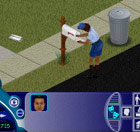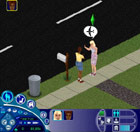|
|
Page 1 | 2 |

 The Sims communicate with thought and speech balloons containing icons which
represent topics of discussion or what items that they want.A diamond-shaped
object which rotates above their heads slowly turns from bright green to dark
red as their mood worsens. Trying to balance their needs can be difficult;
there’s no command which invites a friend over for dinner so that you can
fulfill the hunger and social needs all at once, so careful planning is in
order. As with many of Wrights’ previous games, The Sims requires constant
attentiveness if you want even a chance to succeed.
The Sims communicate with thought and speech balloons containing icons which
represent topics of discussion or what items that they want.A diamond-shaped
object which rotates above their heads slowly turns from bright green to dark
red as their mood worsens. Trying to balance their needs can be difficult;
there’s no command which invites a friend over for dinner so that you can
fulfill the hunger and social needs all at once, so careful planning is in
order. As with many of Wrights’ previous games, The Sims requires constant
attentiveness if you want even a chance to succeed.
 The Gaming World According to Wright
The Gaming World According to Wright“Failure in games is not only okay but crucial to a game being fun,” Wright explains. “What’s very important, though, is that the failure needs to be understandable (‘Why did I fail? How can I avoid it next time?’) as well as interesting. An NPC (non-player character) argument or fight is much more interesting than a wrong buzzer sound.

“Here’s one way to see how important this is: Go online someplace where players are discussing games. Notice how much of the discussion revolves around failures they’ve experienced in their games and how to avoid them. As soon as you stop failing in a game, it tends to get boring fast.”
Given Wright’s years of experience in the videogame industry, it’s not surprising that he’s thought long and hard about what makes gamers and games tick. He does a lot of thinking before he creates a game; in fact, The Sims grew out of an earlier idea for a house building simulation which began gestating in his mind eight years ago. When he decided he needed computer people to use the homes, he discovered that watching them was far more interesting, but he retained the original idea for the house building option in The Sims.
Wright also does a lot of research. Influential books used to develop The Sims include Maps of the Mind by Charles Hampton-Turner and Society of Mind by Marvin Minsky. The original house building sim was inspired by an architecture professor named Christopher Alexander, whose book A Pattern Language sets forth 256 design rules for planning for everything from cities to parks.
Zoning Space on the Western Spiral Arm
Now that The Sims has proven itself to be a smash hit with as much potential as the original Sim City, Wright and his team at Maxis are working on a multi-player version which he says “is going to use the base simulation as a starting point for a rather odd online world.” He thinks the game is successful because “players have so much in it to project themselves on to.”
In the meantime, he’s also at work on a sim involving SETI (the search for extra-terrestrial intelligence), which he’s been researching for the past three years. Specifics about the game are vague and have something to do with his belief that humans are the only intelligent life in the Milky Way galaxy and the first truly alien beings our race will meet will be the machines which we’ve created.
“Will has a unique take on the world,” says Rogers, “and I think that’s what makes his games so interesting. I don’t think anyone has ever thought about making games in quite the same way that he has. It’s a testament to his creativity that his games are so playable and addictive to a wide range of people.”
|
Customizing your Sim Each Sim has eight needs. The bar below each one fills green as that need is satisfied and dips precariously into the red the longer you neglect that area. It’s a constant juggling act to keep all eight in the green. Hunger All Sims need food to keep going. Buy a microwave if you prefer quick meals. Hygiene Regular showering and handwashing helps keep this need fulfilled. Bladder Going to the bathroom is a requirement, but you won’t see anything under those blurred pixels. Energy Sims can get energy by resting, sleeping and drinking coffee. Fun Playing games and watching TV are just two ways Sims can have fun. You can even switch among the types of programming on the TV, from horror to cartoons. Social The more Sims interact with each other, the more you will keep this need in the green. Room All Sims need plenty of space in their homes. They also love windows. |
|
Personality Traits Each Sim also has five personality traits which determine how that Sim will choose to spend his or her free time. When you create a Sim from scratch, you get 25 points to distribute among these areas. Neat Some Sims pick up after themselves and others have to be told to do it. If you leave dirty dishes and trash lying around, flies show up and your hygiene level drops. Outgoing Not every Sim likes to talk with others. Some prefer to be alone, but where’s the fun in that? Active The less active a Sim is, the bigger the couch you should buy. Playful Sims who are playful like to tell jokes and have fun. Nice Just like in real life, not all Sims are nice. In fact, you may even find yourself burglarized by a Sim who doesn’t have any points in this category. Luckily for you, there are burglar alarms available for purchase in Buy mode. |
|
What you need MacOS 8.1 or later G3 processor at 233 MHz or faster (333 MHz recommended) 64 MB of Memory (96 MB recommended) 8X CD-ROM (16X recommended) Hard drive, with 350 MB minimum free space |
|
Bonus Material Once you’ve bought The Sims, be sure to visit Aspyr Media for additional furnishings and add-ons to extend your Sims’ pleasure. Most of the PC add-ons available from Maxis will work as well, simply unzip the files using Stuffit Expander. |